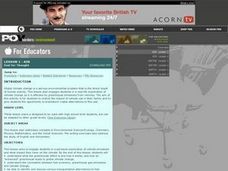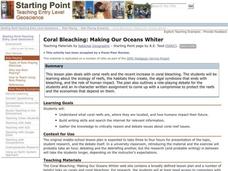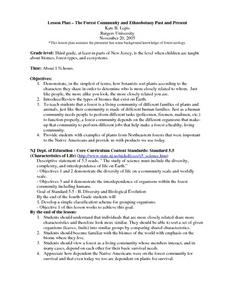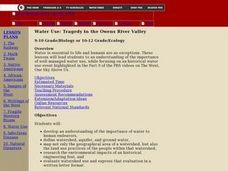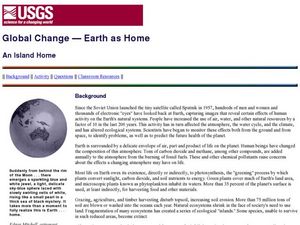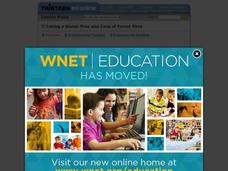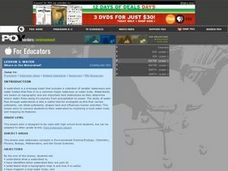Curated OER
I See a Coyote
Students role-play coyotes looking for natural resources. In this natural resources lesson, students examine the relationship between animal life and the environment. Students play a game that demonstrates how natural resources affect...
Michigan Sea Grant
Wetlands
Wetlands may not sound particularly ornate, but they are as important as any habitat! With a hands-on activity, young scientists build a wetland model and observe its many functions in action. They discover the importance of wetlands to...
Curated OER
Forest Food Webs
Students consider the interdependency of life in a temperate forest by studying selected organisms from an Asian temperate forest and creating a food web.
Curated OER
Eco Points Score Card
Students play a game in which points are assigned to daily activities which require fossil fuels or electricity. They compare the impact their energy and transportation choices have in everyday life.
Curated OER
The Salt Water Connection
Students investigate the various factors that influence the Pacific Ocean and Monterey Bay, California. They watch a video about Monterey Bay and take notes, and conduct research and write a report about a specific organism living in...
Curated OER
I Want It! I Need It!
Students compare the difference between needs and wants. In this needs vs. wants lesson, students play a sorting game with picture cards, depicting illustrations of survival needs and material things. Students sort the picture cards into...
Curated OER
From Farm to Table
It's important for students to understand where our food comes from and the environmental implications of agriculture.
Curated OER
Canada's Arctic Barometer
Students research arctic climates. In this Web-quest investigation, students will identify Arctic climate changes, explain the effects of these changes, relate the changes to other regions, and write their findings in a letter format.
Curated OER
Carnival of Carnivores
Students research different species of meat-eating animals in their natural environments to create a Carnival of Carnivores exhibit for their classroom.
Curated OER
The Dirt on Worms!
Fourth graders make predictions, observe, collect and record data. They investigate several soil and worm websites. Finally, 4th graders write a letter to The President which defends earthworms by explaining their value to the United...
Curated OER
Non Native Species: English Ivy-Landscape Plant or Deadly Killer?
High schoolers study the impact that invasive species have on biodiversity and more natural areas.
Curated OER
Air: Fuel For Thought
Students consider the impact of vehicle use in their family and brainstorm viable alternatives to this use. They calculate the total emissions for their family cars during the week, then compare those totals with Hybrid car totals.
Curated OER
Coral Bleaching: Making Our Oceans Whiter
Students study coral reefs and the controversy over coral bleaching. They role-play a debate over the issue and come up with a compromise to protect the reefs and the economies that depend on them.
Curated OER
The Forest Community And Ethnobotany Past And Present
Students describe a forest as a living community. They determine members interact, and in many cases, depend on each other for their basic survival needs. They investigate how dependent the Native Americans were on the forest...
Curated OER
Water Use: Tragedy in the Owens River Valley
Students examine water management issues. In this environmental issues lesson, students watch a PBS video to develop an understanding of watershed, aquifers, and ground water. Students evaluate watershed issues in the Owens River Valley...
Curated OER
Global Change- Earth as Home
Students create their own environment. For this environmental protection lesson, students pretend they are the owners of a tropical island. They create jobs for the citizens and develop the island as a model environment.
Curated OER
Biology: living Things and their Environment
Middle schoolers recognize that organisms depend on other organisms. In this organism lesson, students understand symbiotic relationships and competition. Middle schoolers explain food chains and food webs. Students understand that...
Curated OER
Oil: Impact of a Resource
Middle schoolers discover the history and method of oil production. In this natural resource instructional activity, students investigate early oil production. Middle schoolers discuss the challenges of turning natural resources into...
Curated OER
Marine Life Protected Areas in the O.C.
Students research a Marine Protected Area and determine the species' that benefit from its protection. In this marine lesson students present their findings to the class using PowerPoint.
Curated OER
Taking a Stand: Pros and Cons of Forest Fires
Learners explain the components of fire, explain how forest fires impact man and the environment, analyze data in order to recognize areas that are at risk for forest fires, make recommendations based on research.
Curated OER
Global Warming Statistics
Students research real-time and historic temperature data of U.S. and world locations, and analyze the data using mean, median, and mode averages. They graph the data and draw conclusions by analyzing the data. A spreadsheet is used to...
Curated OER
Co-evolution of Plants and Pollinators
Young scholars explore biological evolution and natural selection and its evolutionary consequences. They also explore how organisms are interdependent on one another.
Curated OER
Water: Where in the Watershed?
Students become connected to their watershed by exploring a local water body and mapping its features. They focus on how the local watershed fits into the larger scheme of the watershed.














